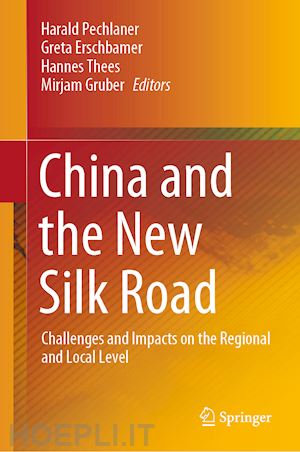
Questo prodotto usufruisce delle SPEDIZIONI GRATIS
selezionando l'opzione Corriere Veloce in fase di ordine.
Pagabile anche con Carta della cultura giovani e del merito, 18App Bonus Cultura e Carta del Docente
This book studies the Chinese “Belt and Road Initiative” (BRI), also called "New Silk Road", and focuses on its regional and local effects. Written by experts from various fields, it presents a range of case studies on the geopolitical, socio-economic, ecological and cultural implications of the BRI for European regions and their stakeholders.
The book is divided into four parts, the first of which discusses the history of and China’s motivations for the BRI. The second part explores the global phenomenon from a number of regional standpoints. In turn, the third part presents studies on the political, socio-economic, cultural and ecological implications of the New Silk Road project. The final part highlights the tourism prospects in connection with the Silk Road project, as tourism has established itself as an important economic sector in many regions along the historic Silk Road. This book will appeal to scholars of economics, international relations and tourism, decision-makers, managers, chambers of commerce and entrepreneurs with special interests in establishing collaboration with the Chinese market.
Harald Pechlaner is head of the Center for Advanced Studies at the European Academy of Bozen/Bozano (Eurac Research) in Italy; and a Professor and Department Chair of Tourism at the Catholic University of Eichstätt-Ingolstadt, Germany. Since 2014 he has also been an Adjunct Research Professor at the School of Marketing/Curtin Business School in Perth/WA. His research chiefly focuses on destination development and leadership, location management and entrepreneurship in a global context. He is the author or (co-) editor of more than 50 books and 150 research articles. Prof. Pechlaner is President of the AIEST (Association Internationale d’Experts Scientifiques du Tourisme) and a full member of the European Academy of Sciences and Arts.
Greta Erschbamer is a researcher at the Center for Advanced Studies at Eurac Research in Italy. She holds a Master of Science in Tourism and Regional Planning from the Catholic University of Eichstätt-Ingolstadt in Germany and a Master of Strategic Tourism Management from SKEMA Business School in France. Her current research focuses on tourism governance, digitalization and design studies.
Hannes Thees is a doctoral candidate and research associate at the Catholic University of Eichstätt-Ingolstadt, Department of Tourism and Center for Entrepreneurship. He completed a double Master’s degree in Tourism and Regional Planning at the Catholic University of Eichstätt-Ingolstadt and the University of Oulu in September 2016. In addition to practical working experience in tour operation and destination management, his main fields of research are the sharing economy, destination governance, technological development in tourism and regional cooperation. Since 2017 Hannes Thees has been engaged in research on the New Silk Road and the role of transit countries.
Mirjam Gruber is a researcher at the Center for Advanced Studies at Eurac Research, Northern Italy. Her main fields of research include political demography, policy analysis, and interdisciplinary globalization studies and analysis.










Il sito utilizza cookie ed altri strumenti di tracciamento che raccolgono informazioni dal dispositivo dell’utente. Oltre ai cookie tecnici ed analitici aggregati, strettamente necessari per il funzionamento di questo sito web, previo consenso dell’utente possono essere installati cookie di profilazione e marketing e cookie dei social media. Cliccando su “Accetto tutti i cookie” saranno attivate tutte le categorie di cookie. Per accettare solo deterninate categorie di cookie, cliccare invece su “Impostazioni cookie”. Chiudendo il banner o continuando a navigare saranno installati solo cookie tecnici. Per maggiori dettagli, consultare la Cookie Policy.